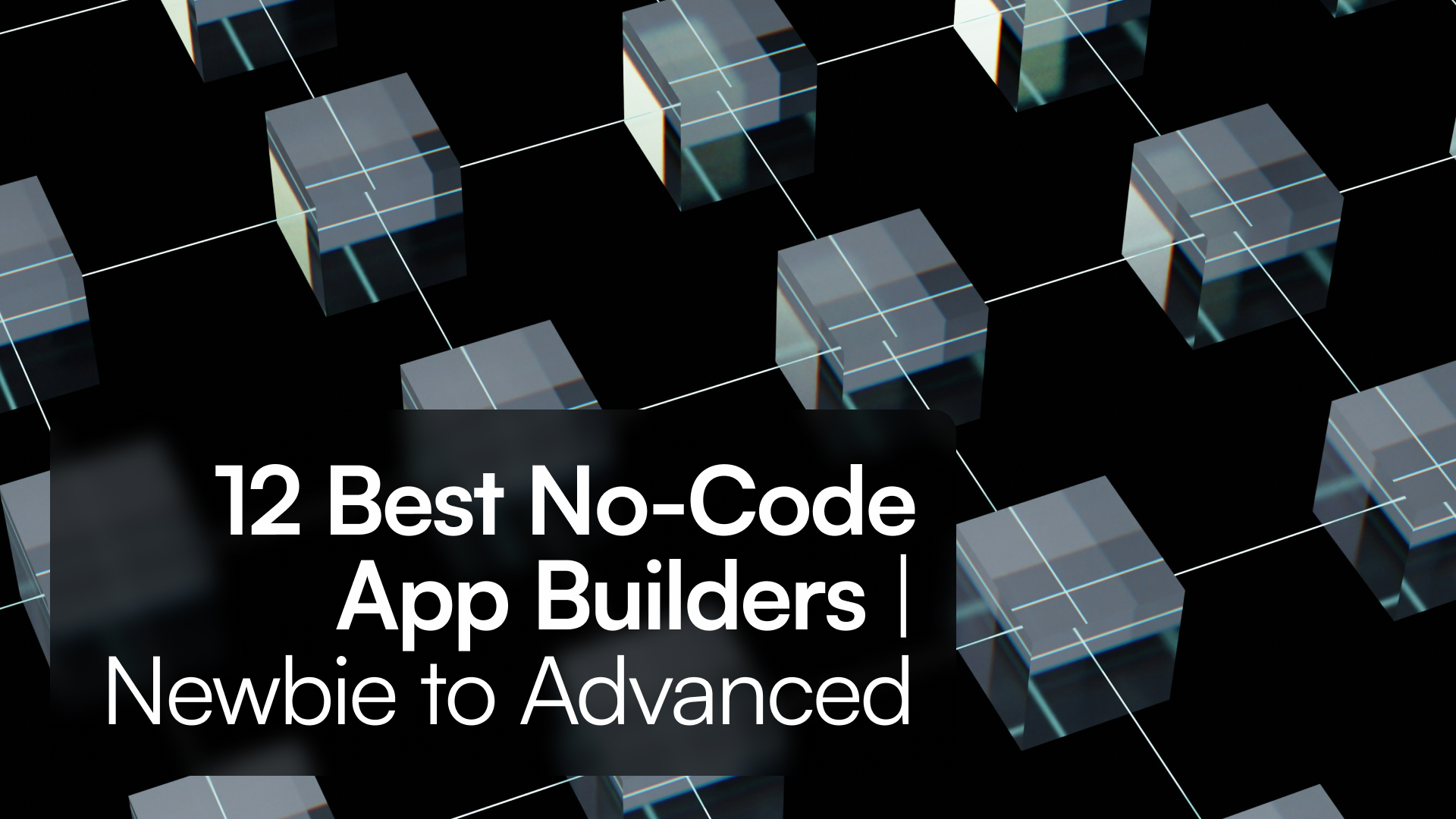Introduction
Building custom apps used to mean hiring developers, writing thousands of lines of code, and waiting months for results. Not anymore. No-code platforms have changed the game, giving businesses the power to create powerful, data-driven apps without writing a single line of code.
At Tadabase, we know this firsthand because we built our own platform to solve those exact challenges. We’ve watched the no-code landscape evolve from basic form builders into enterprise-ready platforms that power real operations, workflows, and growth.
Whether you're just starting out or looking for tools that scale with your business, we’ve evaluated dozens of no-code platforms—and in this post, we’re breaking down the best of the best. Below, you’ll find the top 12 no-code app builders for 2026.
What is a No-Code App Builder?
A no-code app builder is a platform that lets you create custom web or mobile applications without writing any code. Instead of programming, you use visual tools—like drag-and-drop components, logic builders, and pre-built templates—to design your app and define how it works.
These tools are designed for non-technical users but have grown powerful enough to serve advanced teams as well. Whether you’re building an internal tool, a client portal, or a full-fledged SaaS app, no-code builders can help you launch faster and at a fraction of the cost of traditional development.
Benefits of No-Code App Builders:
-
Speed: Build and deploy apps in days, not months.
-
Accessibility: No developers needed; anyone can build.
-
Cost-efficiency: Lower development and maintenance costs.
-
Scalability: Many platforms now support enterprise-grade apps and workflows.
No-code isn’t just a shortcut; it’s a smarter way to build modern software. Below are our top 12 picks for 2026, each with its own strengths depending on your goals.
The 12 Best No-Code App Builders in 2026
1. Tadabase 
We built Tadabase with a clear goal: to enable businesses to create powerful, data-driven applications without needing any coding knowledge. Tadabase isn't just a platform; it's a tool that adapts to your business needs, whether you're building a simple app or a complex, scalable solution. With deep customization and robust database integration, Tadabase stands out as the top choice for those who need more than just a cookie-cutter app.
- Why Tadabase: We’ve designed it to be flexible, scalable, and incredibly user-friendly. It grows with your business, allowing you to build custom apps that evolve as your needs do.
- Perfect For: Businesses that want a platform they can rely on for both simplicity and complexity, all without writing a single line of code.

2. Bubble 
Bubble has established itself as a versatile platform for building web applications. It offers extensive features and flexibility, making it a popular choice among startups and developers alike. While it has a learning curve, the potential to create highly customized apps is worth the investment.
- Why Bubble: Its flexibility allows for complex logic and workflows, making it suitable for both MVPs and full-scale applications.
- Perfect For: Advanced users who are ready to dive into a feature-rich platform and create powerful web applications.
3. Webflow 
For those who prioritize design, Webflow is a standout choice. It’s more than just a no-code tool—it’s a design-first platform that gives you complete control over your website’s aesthetics while still offering robust functionality.
- Why Webflow: It combines design freedom with the ability to build responsive websites and web apps, all without code.
- Perfect For: Designers who need full control over their projects while avoiding the complexities of coding.
4. Glide 
Glide turns your Google Sheets into mobile apps, making it an excellent choice for creating apps quickly and easily. Its simplicity is its strength, allowing users to focus on building without getting bogged down by technical details.
- Why Glide: It’s fast, easy to use, and perfect for creating mobile apps on the fly.
- Perfect For: Beginners and users who need to develop simple apps rapidly.
5. Adalo 
Adalo offers an intuitive drag-and-drop interface, making it easy to create native mobile apps. It’s designed to help users build apps that look and feel professional, without needing to write code.
- Why Adalo: The platform strikes a balance between ease of use and powerful features, especially for mobile apps.
- Perfect For: Users who need to build mobile apps quickly and want more design flexibility than other simple platforms offer.
6. Thunkable 
Thunkable is great for building both mobile and web apps. It’s beginner-friendly but offers enough depth for more complex projects as well. The platform’s strong community and resources make it easy to get started.
- Why Thunkable: Versatility and community support make it a solid choice for cross-platform app development.
- Perfect For: Beginners who want to build apps for multiple platforms without a steep learning curve.
7. OutSystems 
OutSystems is built for enterprise-level applications. It’s a powerful no-code platform designed to create large-scale, secure apps that can handle complex business needs.
- Why OutSystems: It’s packed with features for enterprise-grade applications, ensuring security and scalability.
- Perfect For: Large businesses that need a robust platform for complex, data-heavy applications.
8. Softr 
Softr is all about simplicity and speed. It’s a user-friendly platform that makes web app development accessible to everyone, even those with no technical background.
- Why Softr: The interface is incredibly intuitive, making it easy for anyone to create web apps without technical headaches.
- Perfect For: Beginners and small businesses looking to build web apps with minimal effort.
9. AppGyver 
AppGyver provides advanced customization and control for app development, making it ideal for users who need more than just basic functionality. It’s a powerful platform for creating both mobile and web apps with detailed logic and workflows.
- Why AppGyver: If you need a platform that can handle complex logic, AppGyver is a great choice.
- Perfect For: Advanced users who require deep customization and control over their apps.
10. Mendix 
Mendix is designed for businesses that need to build apps quickly without sacrificing quality. It’s a powerful no-code platform that scales well, making it ideal for companies with growing needs.
- Why Mendix: It combines speed with scalability, allowing businesses to develop and deploy apps efficiently.
- Perfect For: Enterprises that need to build and scale apps quickly.
11. FlutterFlow 
FlutterFlow is a newer no-code platform that leverages Google’s Flutter framework, allowing users to build apps for both iOS and Android. It’s a great choice for developers who need cross-platform functionality without writing separate codebases.
- Why FlutterFlow: Its cross-platform capabilities make it easy to build apps that work on both iOS and Android.
- Perfect For: Developers looking for a streamlined way to build apps for multiple platforms.
12. Quickbase 
Quickbase is a versatile platform that focuses on custom business applications. It’s a powerful tool for businesses that need to build apps tailored to their specific processes and workflows.
- Why Quickbase: Its flexibility allows businesses to create apps that fit their unique needs, streamlining operations and improving efficiency.
- Perfect For: Businesses that require custom applications to optimize their processes.
Choosing the Right No-Code App Builder: From Newbie to Advanced
At Tadabase, we believe that no matter where you are on your app development journey, you should have access to powerful tools that grow with you. Whether you're just starting out or you're an advanced user looking to build complex applications, Tadabase offers the flexibility and scalability to meet your needs. Here's a breakdown of how our platform—and others—cater to different experience levels:
-
For Beginners: If you’re new to no-code, you’ll appreciate how Tadabase simplifies the app-building process with intuitive drag-and-drop functionality and a wide range of templates. Glide and Softr are also excellent choices for building simple apps quickly, but Tadabase stands out by offering a smoother transition as your needs evolve, allowing you to start small and scale up seamlessly.
-
For Intermediate Users: As you become more comfortable with app development, Tadabase grows with you. Its advanced features remain accessible without overwhelming users. Adalo and Thunkable offer great customization for mobile apps, but Tadabase provides the additional power needed for building both mobile and web applications that require more robust functionality.
-
For Advanced Users: When you’re ready to tackle more complex projects, Tadabase truly shines. With its deep customization, automation tools, and integration capabilities, it’s a top choice for advanced users looking to create powerful, data-driven applications. While platforms like Bubble and OutSystems also offer advanced features, Tadabase is unique in its ability to serve all levels of users while still offering enterprise-level scalability.
By choosing Tadabase, you’re not just picking a platform for today—you’re investing in a tool that will grow alongside your business and your skills. Whether you're a beginner looking for an easy start or an advanced user needing powerful features, Tadabase is designed to serve you every step of the way.
Why No-Code is the Future
No-code is no longer a trend; it’s a fundamental shift in how software gets built.
Instead of waiting months for dev cycles, teams are solving real problems in real time. With platforms like Tadabase, operations leaders, IT admins, and even non-technical staff can build secure, custom applications that fit exactly how their business works, without relying on a developer or external vendor.
Whether you're automating internal workflows, replacing outdated spreadsheets, or launching a client-facing portal, no-code lets you do more with less—faster, cheaper, and with full control.
As businesses face growing pressure to move quickly and stay agile, no-code tools are becoming essential, not optional.
Conclusion
Tadabase was built for one reason: to give you complete control over how your business runs, without writing code.
From simple dashboards to enterprise-grade applications, Tadabase adapts to your needs and scales with your growth. You’re not limited by templates or boxed into generic solutions. Instead, you get a platform that’s powerful, customizable, and easy to use—even for non-technical teams.
If you’re ready to build better apps, streamline your workflows, and take ownership of your operations, start with Tadabase. You’ll be surprised at how much you can do in just a few clicks.
Try Tadabase for free and build your first app today.
Frequently Asked Questions
Which is the Best No-Code Mobile App Builder?
The best no-code mobile app builder largely depends on your specific needs and experience level. If you’re new to app development and want something simple, Glide is a great option as it allows you to build mobile apps quickly using Google Sheets as a backend. Adalo is another strong contender for building native mobile apps with its easy drag-and-drop interface. For more advanced users who need cross-platform apps with more customization, FlutterFlow is an excellent choice. It’s built on Google’s Flutter framework, enabling you to create apps that run on both iOS and Android without writing code.
Can I Make an App Without Coding?
Yes, you can absolutely make an app without coding, thanks to the rise of no-code and low-code platforms. No-code app builders like Tadabase, Bubble, and Adalo provide drag-and-drop interfaces and pre-built templates, allowing you to create mobile and web apps without writing a single line of code. These tools simplify the app-building process, making it accessible to entrepreneurs, small businesses, and individuals who might not have a technical background. However, while these platforms remove the need for coding, you still need to plan your app's structure and logic, so be prepared to learn the basics of app development.
What is the Best Low-Code App Builder?
If you need a bit more control over your app's functionality and are comfortable with some coding, OutSystems and Mendix are top choices in the low-code space. Both platforms offer extensive customization options, enterprise-level security, and scalability. OutSystems is particularly known for its rapid application development capabilities, making it ideal for enterprises looking to deploy apps quickly. Mendix also stands out for its strong collaboration tools and ability to handle complex workflows, making it a favorite among businesses needing sophisticated applications without fully custom coding.
What is the Best No-Code Web App Builder for 2026?
For 2026, Tadabase remains a leading no-code web app builder, especially for businesses needing data-driven applications with deep customization options. Webflow is another strong contender, especially for designers who need full control over their web projects. It combines powerful design capabilities with the ability to create fully functional web apps. For those who want a simpler platform, Softr offers a more user-friendly interface that makes web app creation accessible to everyone, even complete beginners.
What is the Difference Between No-Code and Low-Code?
No-code platforms are designed for non-technical users, allowing them to build apps through visual interfaces without any coding. They are ideal for creating simple apps or MVPs (Minimum Viable Products) quickly. Examples include Tadabase, Glide, and Softr. Low-code platforms, on the other hand, offer more flexibility by allowing users to write some code if needed. This makes them suitable for more complex applications that require custom functionality. OutSystems and Mendix are popular low-code platforms.
How Do No-Code Platforms Handle App Deployment?
No-code platforms typically simplify the deployment process by offering built-in hosting and one-click deployment options. For example, with Tadabase, you can deploy your web app directly from the platform without needing to manage servers or hosting. Mobile app builders like Adalo also streamline the deployment process by providing direct publishing options to app stores like Google Play and Apple’s App Store. This ease of deployment is one of the key advantages of using no-code platforms, making app development and launch much faster.
Is No-Code App Development Secure?
Security is a top priority for many no-code platforms. For example, OutSystems and Mendix offer enterprise-grade security features, including encryption, compliance certifications, and robust user authentication options. However, the level of security can vary between platforms, so it's important to choose a no-code tool that meets your specific security requirements, especially if you’re handling sensitive data.
Can No-Code Platforms Handle Complex Applications?
Yes, modern no-code platforms are becoming increasingly powerful and capable of handling complex applications. Tadabase, for example, is designed to manage intricate workflows and large data sets, making it suitable for businesses with advanced needs. Bubble also offers extensive customization and logic capabilities, allowing users to build highly complex web apps. However, if your app requires deep customization beyond what no-code platforms offer, you might want to explore low-code solutions or consider integrating custom code with your no-code app.
What is the Learning Curve for No-Code Platforms?
The learning curve for no-code platforms can vary depending on the tool and your familiarity with app development concepts. Platforms like Glide and Softr are designed for beginners and offer a very gentle learning curve, with plenty of templates and tutorials to get you started. On the other hand, platforms like Bubble and Webflow might require a bit more time to learn, especially if you’re aiming to create more complex applications. However, most no-code platforms provide extensive documentation and community support to help users at all levels.







